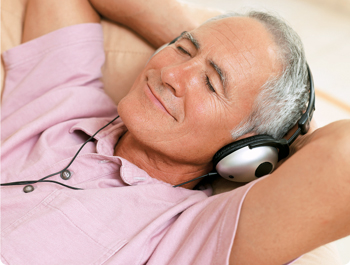
As you get older, your immune system grows less responsive and doesn’t communicate as well with your nervous system. That means, for example, that your white blood cells can’t read signals from your nervous system to turn off inflammation. Music seems able to reestablish that communication and bring hormone and neurotransmitter levels back into balance, helping your immune system function like it did when you were younger. A 2007 study in the journal Critical Care Medicine found that patients who listened to relaxing music for an hour had higher levels of human growth hormone, which is involved in immune function and typically declines with age. At the same time, interleukin-6 (an inflammatory compound produced by your immune system) and the stress hormone adrenaline decreased, calming inflammation and restoring healthy immune function.
In fact, much of music’s ability to strengthen your immune system stems from its stress-counteracting effects. And both listening to and making music offer benefits for stress levels and immunity. After an hour of making music, volunteers over the age of sixty-five showed small increases in several markers of immune function that chronic stress typically lowers, reported researchers in a 2009 study in the Journal of Medical and Dental Sciences. So go ahead and whistle while you work—you might just make your immune system younger!
Listening to music you enjoy can boost your mood, enhance memory and focus, and encourage you to exercise harder, and growing research shows it can also keep you calm. Besides controlling chronic stress, music can help you deal with and recover from isolated stressful events more quickly. For example, patients who were allowed to choose the kind of music they listened to during and after surgery had lowered cortisol levels and increased immunity, according to a 2007 study in the British Journal of Surgery. And a group of writers in a newspaper’s newsroom—a classic high-stress work environment—had lowered cortisol levels after listening to music for thirty minutes while they worked, according to a study in Psychological Reports. For the best stress-busting benefits, pick relaxing music with a slow tempo (unless you’re exercising for stress relief, in which case faster songs can give you an extra energy boost).
A caveat: Keep the volume down to avoid damaging your hearing and actually increasing your stress. A 2009 study in the journal Environmental Health Perspectives found that women who were exposed to noise louder than 60 decibels had cortisol levels 34 percent higher than those who listened to noise at 50 decibels or less. To protect your hearing, turn the volume on your stereo down a notch or two, and limit using in-ear headphones, or earbuds, to a few hours a day at 70 percent volume or less.

In addition to listening to your favorite tunes, making music also reduces stress and keeps your immune system functioning optimally as you get older. A 2005 study in the journal Medical Science Monitor found that people who participated in a recreational music-making activity after being exposed to a stressful situation significantly lowered several markers of the stress response compared to those who just rested. In fact, making music may have a stress-soothing edge over other relaxing activities. Japanese researchers found that employees who made music for an hour had lower levels of stress-induced inflammation and increased natural killer cell activity (a marker of immune function) than those who read leisurely.
Whether you enjoy the communal experience of singing in a choir or the physicality of banging on bongos, making music with others can offer mental, social, and physical stimulation (a combination that’s also key to boosting your brainpower as you get older [?33]). That can further increase the stress-reduction benefits, since mixing those elements engages your mind and your body to change your stress response. If you don’t want to join a musical group, try gathering friends to play a video game like Rock Band. But you don’t have to go public with your musical talents to keep your immune system young: Solo music making still counts. Sing in the shower or the car, or drum on your desk while you’re waiting for Web pages to load.